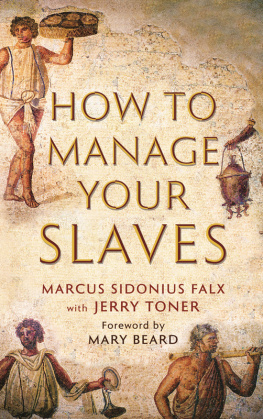RELEASE YOUR INNER ROMAN

MARCUS SIDONIUS FALX is a Roman of noble birth. After serving with distinction in the legions, he retired to manage his substantial country estates. He now divides his time between his properties in Campania and the province of Africa and his luxury villa on the Esquiline hill overlooking Rome. His assistant and amanuensis, Dr Jerry Toner, is Fellow and Director of Studies in Classics, Churchill College, Cambridge University. Dr Toners previous books include How to Manage Your Slaves and The Ancient World. His next book, Emperors and Crooks, will be published by Profile in 2018.
By the same authors
HOW TO MANAGE YOUR SLAVES
RELEASE YOUR INNER ROMAN

MARCUS SIDONIUS FALX
Commentary by Jerry Toner

First published in Great Britain in 2016 by
PROFILE BOOKS LTD
3 Holford Yard
Bevin Way
London WC1X 9HD
www.profilebooks.com
Text and commentary Jerry Toner, 2016
The moral right of the authors has been asserted.
All rights reserved. Without limiting the rights under copyright reserved above, no part of this publication may be reproduced, stored or introduced into a retrieval system, or transmitted, in any form or by any means (electronic, mechanical, photocopying, recording or otherwise), without the prior written permission of both the copyright owner and the publisher of this book.
A CIP catalogue record for this book is available from the British Library.
eISBN 978 1 78283 168 6
AUTHORS NOTE

I AM A ROMAN. I am one of that heroic people who have conquered the known world. I am also a highly successful Roman. My ancestors won glory on the battlefield, a tradition I have maintained with my distinguished service in the legions. I count the emperor as a personal friend, have recently been awarded a consulship and own estates worth many millions of sesterces. I have applied the same rigorous approach to all areas of my life from making money, to acquiring a wife, to getting the gods on my side. No one is better placed to tell you the secrets of how to succeed the Roman way. Up to now you barbarians have had to settle for marvelling at the achievements of us Romans. But even barbarians can improve themselves. This guide will tell you all you need to know to bring out your Roman side.
There can be few men more in need of this book than Jerry Toner. He has the audacity to teach others about the great achievements of Rome when he has learned nothing from them himself. He studies ordinary Romans when he could learn everything he needs from Romes great heroes. His household is a shambles. His children run amok and treat him like some kind of domestic slave. He even lets his otherwise delectable wife dictate to him on matters on which any respectable woman should be silent. I have reluctantly to admit that he is living proof of the limits of self-help because, put simply, he has no inner Roman to release. But his shameful example need not hold others back and if his work enables my message to reach a wider barbarian audience then he will finally have achieved something worthwhile.
Marcus Sidonius Falx
Rome, Kalendis Ianuariis
COMMENTATORS NOTE

IT HAS ONCE AGAIN BEEN my dubious pleasure to work with Marcus Sidonius Falx. He is a larger-than-life character who has not a single doubt about the truth of his beliefs. In his eyes, the Romans were quite simply the greatest, most successful people ever to inhabit the earth. While there will always be some academic disagreement about how representative his opinions are of all Romans, there can be no doubt that his views give us an insight into the characteristics which many at the top of Roman society thought made it great.
Roman society did not believe in equality. What mattered was status. Whether it was conquering foreigners, punishing slaves or standing as patriarch over their families, the Romans were extremely comfortable with the idea of hierarchy. They did all they could to improve their position in society. This puts Marcus in the ideal position to instruct us on how to succeed in the modern rat race. The Romans also had no problem about showing off their wealth and power. Success and display went hand in hand. From giving great games to owning large numbers of slaves and feasting at banquets, the Romans treated such expenditure as a simple index of their achievements in life. There is no one better than Marcus to let you into the secrets of living the good life. The Romans also had clear targets that they went about achieving in an often brutally efficient way. This no-nonsense approach to getting what they wanted was applied to all parts of human existence, from romance to finance. There is much that is still relevant to today.
Marcus is a man of empire. I cannot be certain exactly as to his dates but his views seem to reflect the kind of outlook associated with the early empire of the first and second centuries AD. Needless to say, the opinions expressed in the following pages are not my own and it is not without some hesitation that I make them known to a wider non-Roman audience. But I hope that in doing so Falxs text will show that the Romans could behave in a remarkably similar way to people today, even if they valued a very different set of personal traits than those found in modern self-help books. The Romans inhabited a tough world where life was short and cheap. Most of them could not afford the luxury of individualism or personal development. I will leave it up to you to decide whether you wish to adopt these characteristics in your own life. A brief commentary at the end of each chapter puts Falxs words in context and also tries to undercut some of his more exaggerated posturing and appalling self-justifications. Used alongside the further reading at the end of the book, this will point those who want to find out more towards the underlying primary sources and modern scholarly discussion.
Jerry Toner
Cambridge, October 2016
CHAPTER I
THE HABITS OF HIGHLY HEROIC ROMANS

M ANY DECADES AGO, the Roman people threw off the yoke of monarchy and exiled their arrogant king, Tarquin the Proud. In response, the Etruscan king, Lars Porsena, besieged the city of Rome in an attempt to reinstate Tarquin and squash the infant republic. It took acts of the greatest heroism ever witnessed to convince the invader that he could never win. You can have no better examples of the characteristics that have made the Romans the most successful people the world has ever seen.
The first concerns a young Roman of noble birth, Gaius Mucius. The ongoing blockade meant that food became scarce and the price of what little there was went sky-high. Mucius thought it was outrageous that Rome, having finally rid itself of its hated king, was now being besieged by the Etruscans whom they had often defeated in battle. He resolved to avenge this insult by carrying out a feat of great bravery. He decided to penetrate the enemy camp on his own and try to assassinate the foreign king. But after he had thought it over, he was worried that if he went without being specifically ordered to do so by the consuls, he might be spotted by the Roman guards and arrested as a deserter trying to flee the city in her hour of need.
Next page











